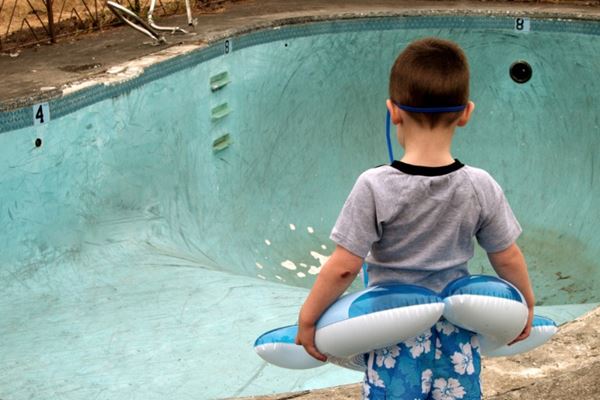Floating Swimming Pools: Part I

This is the first blog of a two-part series on the common factors that can impact a pool enough and cause it to pop or float. Read part two in the series.
Spring is here, which means summer is right around the corner, bringing with it warmer weather. As pools begin to open up, this article can serve as a reminder for a common, yet sometimes mysterious claim—floating pools.
When you read the title you probably wondered how a swimming pool can float. Or perhaps you thought it was another fancy pool like an infinity pool. Nope. Sorry. Swimming pools can actually float, and it is not a good thing when it happens! Insurance professionals who have been faced with a claim arising from a floating pool may be wondering if there is coverage for such a loss.
Why Does a Pool Float?
In order to understand how a pool can float, it might be helpful to explain the principle by refreshing our memories on a fellow called Archimedes. He was a Greek scientist that lived more than 2,000 years ago. Among many other contributions, his most well-known one is related to buoyancy and is generally called "Archimedes' Principle." This principle states that the force acting upward on an item that is immersed into a liquid is equal to the weight of the liquid that is displaced. So if a boat is placed on a lake, a portion of the hull will sink (be immersed) into the water. The volume of the water that is displaced by the boat can be converted into a weight, which is then the force that is keeping the boat afloat (the buoyancy force). If the weight of the boat is heavier than the weight of the water it displaces, the boat will sink.
But, you say, a swimming pool has water within it, not outside of it like a boat, so how does Archimedes' principle apply here? Well, it has a lot to do with groundwater levels.
The Rise and Fall of Groundwater Levels
Do you remember the time, many years ago, when you went to the beach by the lake or ocean and you dug a hole in the sand? If you were close to the water or really industrious and dug a deep hole, you would have found water entering the hole. When the water level stopped rising in the hole that would define the groundwater level at that location. You can dig a hole miles away from any body of water and find the local groundwater table. It could be a few feet below the surface (not usually) or it could be tens or hundreds of feet (more common).
A high groundwater level is the death knell of an empty pool, because, wait for it, it is akin to a boat on a lake. If the groundwater rises high enough, and the pool is empty enough, the buoyancy force acting on the base of the pool will force the pool upward until the forces (the downward acting pool's weight caused by gravity and the upward buoyancy force of the groundwater) are balanced. Archimedes' Principle in action.
You might be wondering how a pool could be installed and not float, but then float months or years down the road? Read on to find out!
Pool Installation Process and Why It's Important
Let's focus on in-ground pools. Some have a rigid structure like fiberglass or concrete. Other in-ground pools have a vinyl liner. If the liner bubbles or blisters upward, it's due to the groundwater rising when it is empty. Insurance claims relating to vinyl-liner pools typically arise from a loss of water in the pool due to damage to the liner or leaking piping.
Concrete pools are basically formed in place or sprayed (called gunite or shotcrete) over a reinforcing steel latticework that is placed around the perimeter of the pool against the ground In order to do that, an excavation conforming to the pool shape is made and the concrete is placed into the formwork or sprayed in place. Fiberglass pools are a rigid, preformed element that is essentially dropped into an excavation that is slightly larger than the pool, and then the remaining areas around the pool are filled in with soil backfill.
Whether the pool is concrete or fiberglass, it can still "float." Now, surely the pool installer wouldn't place the pool into an excavation full of water, right? You are right, and the next section explains this further.
Changes in Groundwater Level
The natural level of water in the ground is typically called the water table or groundwater table. There can also be trapped water pockets in the ground that are found above the natural water table. Those pockets are often referred to as the perched water table. The groundwater level will typically fluctuate between the winter and summer months. In North America, the level will usually be lower in the summer and higher in the winter/spring.
It is fair to say that most pool installers will not install a pool into the ground with the deepest part of the pool at a lower depth than the natural groundwater level. To do so is just asking for trouble. Of course, it can be done if an extensive set of wells are installed around the pool to draw down the water table around the pool, but most people are not going to go to those extremes.
However, there are things that can happen, from time to time, which can temporarily raise the level of water in the ground around a pool. When that happens, if there is not enough water in the pool then, "pop" goes the pool, and you have a major issue. So what things can impact the groundwater level around a pool enough to cause it to pop? Check out our next blog to learn more about the common factors that cause floating pools as well as damages associated with a "popped pool" and the six things to consider when assessing a claim for a floating pool.
Our experts are ready to help.


